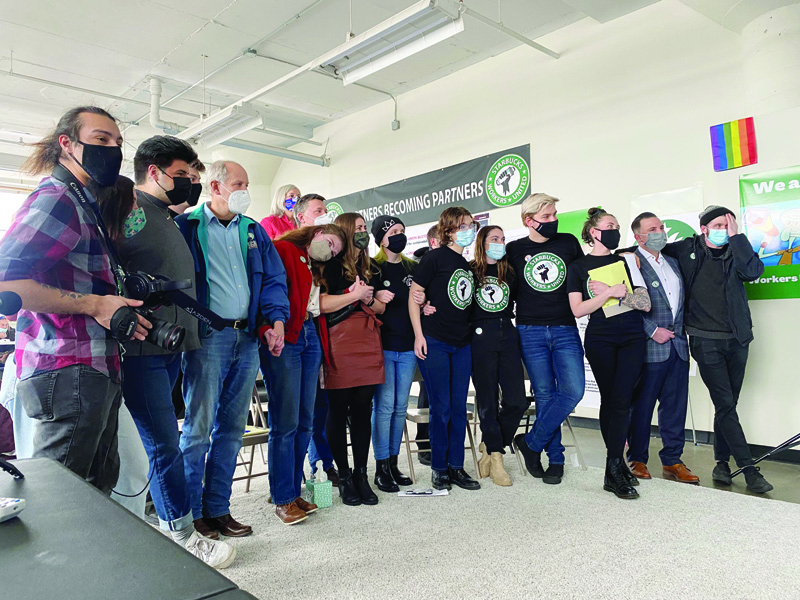 BUFFALO: Starbucks employees wait for results of a vote count, on Thursday in Buffalo, New York. - AFP
BUFFALO: Starbucks employees wait for results of a vote count, on Thursday in Buffalo, New York. - AFP
BUFFALO: The Starbucks employees who led a landmark fight to form a union are overwhelmingly in their 20s and show a zeal to improve working conditions at the coffee chain. They won their bid to create the first union in one of the Starbucks' company-owned US cafes, despite heavy pressure from management to defeat the effort.
"This generation, this Gen Z, has the highest favorability of unions in my lifetime," said Richard Bensinger, a seasoned trade union organizer who helped the young baristas in their fight. "They are people that have no hope of owning a home. They have two jobs. They have student debt. They understand there's the billionaire class, and there's everybody else."
Will Westlake, 24 and a member of organizing committee Starbucks Workers United, says he experienced that dynamic his own life. He saw his big sister, 11 years his senior, as she struggled to find work in her field and was forced to do odd jobs to pay off the $100,000 she borrowed for her studies. He wants to be able to earn a decent living, even by working in a cafe. "The United States is not a manufacturing hub that it used to be. This is a service economy," he said. Failing to improve working conditions for those jobs would condemn "70 percent of our population to being poor in the long term," Westlake said.
'Treated like garbage'
His colleague Natalie Wittmeyer was hired at Starbucks only a month ago but quickly joined the union movement, offended by the methods management used to monitor employees since the start of their campaign. "I think I speak for a lot of the young people in America who are tired of being treated like garbage because we work fast food... or because you're young," she said.
RJ Rebmann, 26, said the victory "just goes to show that at the end of the day, working-class people know what their interests are, and even when we are being lied to and union busted and intimidated, we can still prevail in the end." The mobilization of these young people may not be surprising given Buffalo's history of strong labor movements, which allowed generations of workers to achieve decent standards of living.
Bensinger said Starbucks employees work just as hard as unionized factory workers, and they want a voice in their working conditions and to "not be patronized by the company." He proudly watched them speak one after the other at the press briefing Thursday following their victory: a clear vote in favor of a union at the Elmwood Avenue cafe in Buffalo, and a majority of the votes at the Genesee Street location, near the airport. Though some votes have been contested at the Genesee Street shop, the union remains confident. They however lost a bid at a third cafe.
'Fed up'
Ruth Milkman, a longtime specialist in workers' movements at the City University of New York, sees a clear trend building. After years in decline and growing disillusion among older workers, "Unions are cool again for this generation," she said. Workers "are fed up with the economic conditions" and "they're pretty eager to try to make it work," but she cautions that they still face "a very dysfunctional system of labor law." "Winning an election is great, but it's only the first step," she said. While the company has the obligation to negotiate "in good faith," that does not necessarily lead to a salary agreement.
Just over six percent of private sector workers belong to a union, and she said a victory at two shops in the huge coffee chain is unlikely to change that. Rebecca Kolins Givan, a union specialist at Rutgers University, is more optimistic. "Even though it's one Starbucks out of thousands in the country, it shows that it can be done and that workers can succeed," she said. And it serves as an example for "young workers in the US that don't have very much experience with unions, with what it means to be in a union." - AFP
.jpg)



